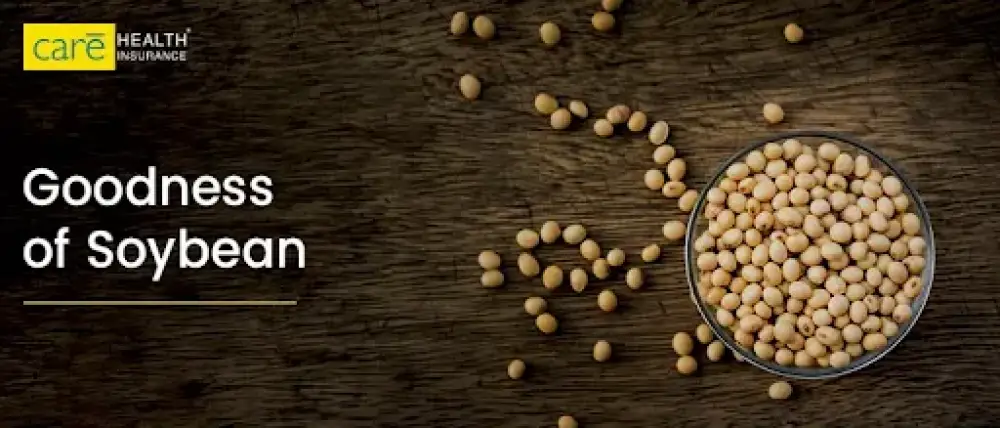Subscribe to get weekly insights
Always stay up to date with our newest articles sent direct to your inbox
Published on 25 Apr, 2025
Updated on 6 May, 2025
1143 Views
3 min Read

Written by Yashita Sinha
Reviewed by Akhil Pillai
favorite1Like
If you’ve ever come across health-conscious individuals and happened to ask them for diet tips, soybeans are one of the food elements that they would recommend. As a rich source of protein, soybeans help reduce cholesterol levels in the body.
Soybeans also contain good amounts of soluble and insoluble fibre, which aid digestion. The health benefits of soybeans extend far beyond these two. In this blog, we’ll know about the types of soybeans, their nutritional value and unique advantages. So, without further ado, let’s get started.
Soybeans are a type of legume that originated in East Asia. They are widely grown for their edible beans, which are a rich source of protein, making them a staple in vegetarian and vegan diets. They are also high in essential vitamins, minerals, fatty acids and are used for producing a variety of food products such as tofu, soy sauce and soy milk.
Several types of soybeans serve different purposes in food and oil production. The most common types include:
Soybeans are composed of a combination of protein, fats, carbohydrates, vitamins, minerals and fibre. In 100 grams of boiled soybeans, there are:
Soybeans are a highly versatile crop used in numerous industries. As a rich source of plant-based protein, soybeans are used in foods like soy milk, tofu, and tempeh. They are also essential ingredients in condiments and sauces.
Beyond the food industry, soybeans are employed in the production of biodegradable plastics, adhesives, lubricants, crayons, and candles. Their high protein content is also utilised in producing biofuels, such as biodiesel. Additionally, soybeans are used in the cosmetic industry for products like lotions, soaps, and shampoos.
Here are the top benefits of including soybeans in your diet:
Including soybeans in your diet can help reduce total and low-density lipoprotein (LDL) cholesterol levels, thus alleviating concerns about high cholesterol. The soluble fibres present in soybeans bind to cholesterol in the digestive system and remove it from the body before it can be absorbed into the bloodstream.
Note: Studies suggest that consuming 25 grams of soy protein every day can result in significant LDL levels.
Soybeans help maintain good heart health by lowering LDL (bad) cholesterol and increasing HDL (good) cholesterol levels. The isoflavones (plant compounds) present in soybeans also help lower blood pressure and reduce inflammation, further promoting cardiovascular health.
A 2022 study published in In Vivo found that women who included more soy isoflavones in their diet had a lower risk of developing breast cancer. These plant compounds mimic estrogen in the body but are weaker than the natural estrogen, helping to balance hormones. Additionally, its anti-inflammatory properties reduce the risk of breast cancer.
Soybeans may help reduce the risk of type 2 diabetes due to their isoflavones and protein content, which can significantly improve glucose tolerance and insulin resistance. Isoflavones decrease blood pressure and blood glucose levels, and proteins enhance lipid profiles that further contribute to better metabolic health.
>>Read More: Sattu Health Benefits: High Protein Diet Food & Drink
Now that we've reached the end of this blog and you are well-aware of the benefits of soybeans, consider incorporating them into your regular diet. Whether you exercise regularly at the gym, run, or engage in other physical activities, soybeans can be an excellent source of protein, especially for those seeking non-meat options. So, for your next visit to the grocery store, don’t forget to buy soybeans.
Thyroid : मामूली नहीं हैं महिलाओं में थायराइड होना, जानें इसके लक्षण और घरेलू उपचार Vipul Tiwary in Diseases
शुगर कंट्रोल कैसे करे? जानें, डायबिटीज में क्या खाना चाहिए Vipul Tiwary in Health & Wellness
हाई ब्लड प्रेशर को तुरंत कंट्रोल कैसे करें? देखें इसके उपाय Vipul Tiwary in Diseases
पैरों में दर्द किस कमी से होता है? जानें, इसके घरेलू इलाज Vipul Tiwary in Health Insurance Articles
Iodine Rich Foods: The Unsung Heroes of a Healthy Thyroid and a Sharp Mind Jagriti Chakraborty in Diet & Nutrition
What Happens to Your Body When You Eat Capsicum Every Day? Jagriti Chakraborty in Diet & Nutrition
Smart Guide to Reading Nutrition Labels for Healthy Choices! Sejal Singhania in Health & Wellness
Say Goodbye to Low Estrogen Symptoms: Causes, Symptoms & Easy Lifestyle Fixes Jagriti Chakraborty in Diet & Nutrition
Soybeans are primarily grown for their high protein content, used in food products like tofu and soy milk. They are aslo primary ingredients in animal feed and biofuels.
Yes, soybeans are considered good for health and have numerous benefits. Being a rich source of protein, fibre and plant compounds, soybean reduces the risk of heart diseases, cancer and high blood pressure.
Yes, soybeans are good for weight loss due to their high protein and fibre content, which helps in weight management.
One cup of cooked soybeans contains around 280-300 calories, depending on the preparation.
Soybeans are a rich source of protein, with about 28 grams of protein per cup of cooked soybeans.
No, soybeans don’t significantly increase estrogen levels in the body. However, the isoflavones present in soybeans mimic the action of estrogen in the body.
Soybeans typically take 45 to 65 days to flower and 90 to 120 days to reach full maturity, depending on the variety and climate.
Always stay up to date with our newest articles sent direct to your inbox
Loading...